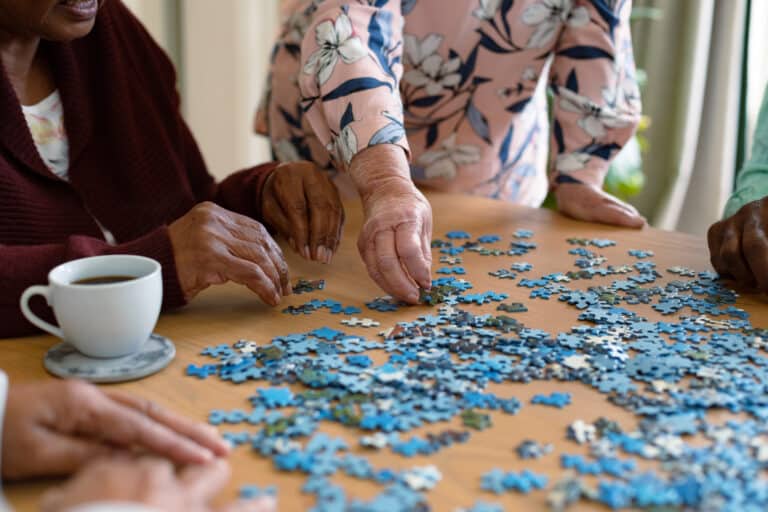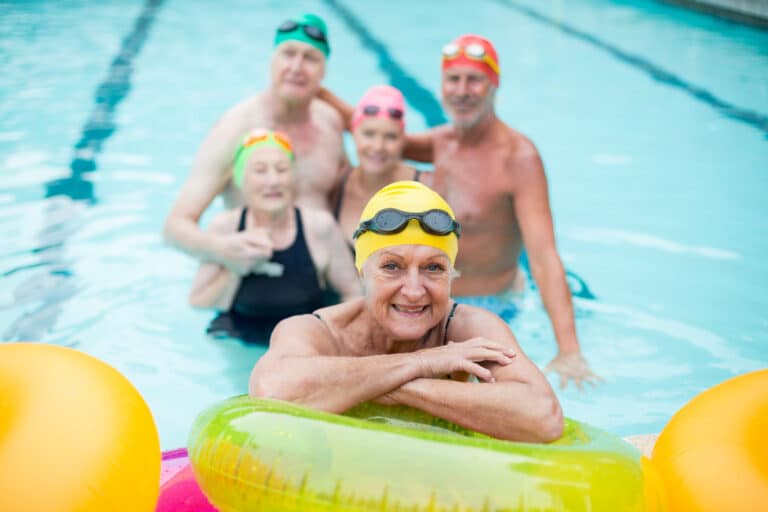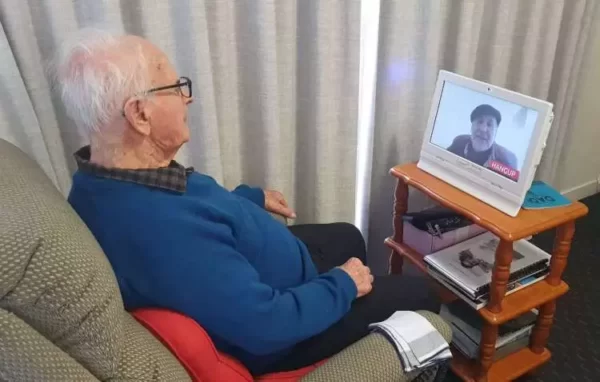As people age, their physical and mental abilities change, making it essential to engage elderly folks in activities that support overall health and wellbeing.
It’s widely believed that crucial activities for aged care residents include, but are not limited to:
-
- Physical activity
- Social activity
- Regular and meaningful communication with loved ones
What’s more, the research, studies and voices of major healthcare authorities all agree: aging is a process that requires empathy, support and high levels of fulfillment in order to help elderly people live their best-possible lives.
In this article, we’ll explore three key aged care activities that are specifically designed to support the elderly people in your life. Including exercise, social activities, and healthy communication. This list will help you design a life of happiness, joy and satisfaction for your loved ones.
Let’s begin with the basics:
Aged care resident activities
Helping the elderly people in your life both plan and engage in various activities – both physical and cognitive – is essential for several reasons.
Firstly, it helps to promote physical activity, which is important for maintaining mobility, preventing falls, and managing chronic conditions. According to the Age UK charity, falls are a leading cause of hospitalization among older adults in the UK, with an estimated 4 million falls reported every year. Importantly, engaging in regular physical activity can help to reduce the risk of falls and related injuries.
Secondly, activities for the elderly can help to promote cognitive stimulation, which is important for maintaining mental acuity and reducing the risk of dementia. According to Alzheimer’s Research UK, around 850,000 people in the UK are living with dementia, and this number is expected to rise to over 1 million by 2025.

Importantly, both of the aforementioned activity types combine to form conditions that are essential for maintaining emotional wellbeing and preventing loneliness and depression. According to the United Kingdom’s Campaign to End Loneliness organisation, around 1.4 million older people in the UK report feeling lonely, with nearly a third of people aged 75 and over living alone. Engaging in social activities and connecting with friends and family can help to prevent social isolation – a topic that we’ve explored in-depth across our various publications at Konnekt.
Let’s take a look at some of the main types of activity that can help the elderly loved ones in your care maintain a sense of life-long fulfillment, dignity and passion.
How keeping active can benefit aged care residents
Put simply, engaging in relatively healthy levels of exercise is not only essential for all people, but for older adults in particular.
According to the Australian Institute of Health and Welfare, an estimated 67% of adults aged 65 years and older engage in physical activity. This percentage has risen since the start of the pandemic, with older people and their loved ones truly coming to recognise the wide range of benefits offered by staying active on a daily basis.
Research conducted by the American Heart Association has found that regular physical activity can reduce the risk of developing chronic diseases, such as heart disease, stroke, and diabetes. Safe exercise activities for older adults can range from simple stretches and chair exercises to more advanced activities such as yoga, tai chi, and dance. These activities can help improve strength, flexibility, balance, and coordination, which can help reduce the risk of falls and injuries.
Examples of physical activities for older adults
- Appropriate cardio activities such as short walks
- Low-impact swimming or water-based exercise
- Ability-appropriate weight-bearing workouts
- Stretching
- Outdoor social games such as bowls
- Short trips to the grocery store or for other essential items

Most residential care homes employ a Lifestyle Activities Coordinator or Diversional Therapist to organize a program of regular activities and encourage participation.
What’s fantastic about physical activity is that it can often be conducted with the assistance and company of a loved one or carer. This helps to keep the activity enjoyable and sustainable for the elderly person in your life.
In Australia, an estimated 67% of adults aged 65 years and older engage in physical activity, according to the Australian Institute of Health and Welfare. In the UK, more than half of adults over 65 years engage in moderate physical activity. This number is only expected to grow.
How social activities can benefit elderly people
Social activities are also an essential aspect of aged care lifestyle activities.
In the United States, 43% of adults aged 65 years and older report feeling lonely, as reported by the American National Institute on Aging. In Australia, 15% of adults aged 65 years and older report feeling socially isolated (Australian Institute of Health and Welfare).
Much of the contemporary research about fulfilled aging recommends that planned social activities can help older adults maintain both cognitive ability and emotional wellbeing, as well as tackle many causes of social isolation as detailed in the aforementioned research.
Participating in social activities can also help prevent depression and loneliness, which can have a significant impact on an older adult’s mental and physical health.

Examples of social activities for elderly people
- Board games and card games
- Puzzles
- Book clubs
- Group activities such as bowls or bocce
- Cultural activities such as going to the theater or a music performance
In addition, the advent of contemporary technology has made it possible for older adults to engage in social activities such as virtual game nights and video chats with family and friends. For example, Konnekt Videophone supports both group calls and screen sharing functions, allowing more opportunities to chat with more people and engage in group activities.
How health communication benefits older people
Maintaining good communication with friends and family is an essential aspect of aged care lifestyle activities. Good communication can help older adults maintain social connections and feel connected to their loved ones, even if they cannot see them in person.
Communication activities can include letter writing, email, phone calls, and video chats. These activities can help older adults share news and stories with their loved ones, maintain connections with distant family members, and provide opportunities for reminiscing about the past.
In the United Kingdom, 61% of adults aged 75 years and older use the internet, according to the Office for National Statistics. In Australia, 48% of adults aged 65 years and older use the internet to communicate with family and friends, according to the Australian Institute of Health and Welfare.
This increased awareness of technology has helped facilitate the rise of a number of purpose-designed communication devices – such as the Konnekt Videophone and Konnekt Captioning Videophone – that help elderly people maintain meaningful human connections.
Video and captioning communication technology is a type of assistive technology that has the ability to provide text-based captions or subtitles for audio and video content. It can be used to make media accessible to individuals who are deaf or hard-of-hearing, as well as individuals who may have difficulty understanding spoken language due to cognitive or language-related disabilities.

With their super-large screens, large buttons, one-touch-to-call function and the ability to call a huge range of devices including mobile phones, Konnekt’s incredible video-call technology is paving the way for exciting developments in social connection for the elderly. Many families organize regular group calls, share photos to the Videophone, and even host virtual dinner evenings across two or more locations.
With our device, you could plan interactive and meaningful social gatherings. You could also include activities to do over a video call, such as brain training (puzzles, reading together), playing games, leading physical exercise, reminiscing, and even participating in music therapy!
You can learn more about other people’s overwhelmingly positive experiences with Konnekt products here.
Wrapping up
Exercise activities, social activities, and health communication are three of the best activities for people in aged care. By promoting physical and cognitive stimulation, they facilitate the maintenance of emotional wellbeing, helping prevent depression and ensure a connected, dignified life for people in their later years.
Keen to learn more about combating social isolation and promoting aged care lifestyle activities? Check out our blog or give our friendly Konnekt team a call today on 1300 851 823.
References:
- “Dementia statistics hub”, Alzheimer’s Research UK
- “Falls prevention”, Age UK
- “Facts and statistics”, Campaign to End Loneliness
- “Loneliness and Social Isolation Linked to Serious Health Conditions”, National Institute on Aging
- “Physical activity and aging”, American Heart Association
- “Insufficient physical activity”, Australian Institute of Health and Welfare
